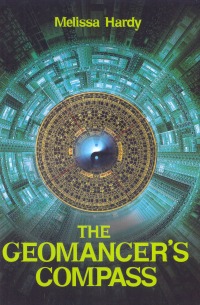| ________________
CM . . .
. Volume XIX Number 16. . . .December 21, 2012
excerpt:
Critically acclaimed and award-winning short fiction author Melissa Hardy makes her young adult literature debut with a hybrid mystery-science fiction tale centred around a tragic misfortune buried deep in a Chinese-Canadian family's past. Over one hundred years ago, Qianfu Liu was murdered while working on the CPR in Moose Jaw, SK. Several years later, his bones were confiscated and subsequently misplaced. Since then, Qianfu's spirit has wandered the afterlife inflicting unspeakable chaos and destruction. The descendants of the Liu family, in particular, have taken the brunt of this punishment in the form of freak accidents, unexplainable diseases, and rare disorders. In order to stave off further terror for her family and reverse the curse, 16-year-old Miranda Liu must travel to Moose Jaw, locate the bones, and rebury them with dignity in observance of feng shui. Not alone in this mission, Miranda is accompanied by Brian, her abnormally inquisitive dyslexic cousin, and (occasionally) by the gentle spirit of the recently deceased and the much revered Liu family patriarch, The Grandfather, who is none other than Qianfu's twin brother. Miranda is also in the possession of the geomancer's compass, an ancient Chinese tool used to identify and balance positive and negative energies. Unfortunately, for Miranda's sake, she has no understanding of how to use the compass. Charged with what seems like a near impossible assignment, Miranda and Brian slowly but surely chip away at the task at hand. They rely heavily on the technology of their time—the book is set in the not too distant future of 2021—including an arm-mounted touch screen personal computer and virtual reality eyeglasses which allow (among other things) communication with The Grandfather. Despite all of these advances, ironically, it is the information revealed by the kindness of a stranger which leads Miranda and Brian to the lost bones. Once there, an anticlimactic battle is waged with Qianfu's Ghost, fought entirely by the spirit of The Grandfather. The novel's greatest appeal rests largely in the uncovering of the mystery behind the missing bones and the circumstances surrounding Qianfu's unfortunate murder. Through these two interwoven plot lines, readers are introduced to aspects of Canada's early Chinese immigration history; the topics of government policy and head taxes, and the hardships encountered by Chinese newcomers—the segregated and impoverished conditions in which they were forced to live, and the racism and physical violence they endured—are all explored. A brief history of Moose Jaw and the town's secret network of underground tunnels utilized by rumrunners and gangsters are also included, perhaps if only to convince young readers that even seemingly mundane small towns have interesting and significant histories worth exploring. The book's rather sombre tone is tastefully balanced with a good measure of humour. Brian, more so than Miranda, with his insatiable compulsion to talk with strangers and his intense hyperactivity is the driving force behind much of the book's lighter moments. Together, however, they are the perfect complement to each other, despite being near complete opposites. By the end of the story, each gains a greater understanding of one another, but rather surprisingly; it is Miranda who learns that she has a lot more growing up to do. The Geomancer's Compass will do well among middle grade aged readers, especially those interested in mystery and early Canadian history and Chinese culture themed novels. The book may also appeal to science fiction fans, but, as these elements are not fully realized, being limited largely to several key technologies, The Geomancer's Compass may not appeal to the sci-fi purist. Nevertheless, Hardy has crafted a well-thought-out tale, one which is equally engaging as it is enlightening. Recommended. Andrew Laudicina, an MLIS graduate from the University of Western Ontario in London, currently resides in Windsor, ON.
To comment
on this title or this review, send mail to cm@umanitoba.ca.
Copyright © the Manitoba Library Association. Reproduction for personal
use is permitted only if this copyright notice is maintained. Any
other reproduction is prohibited without permission.
NEXT REVIEW |
TABLE OF CONTENTS FOR THIS ISSUE
- December 21, 2012
AUTHORS |
TITLES |
MEDIA REVIEWS |
PROFILES |
BACK ISSUES |
SEARCH |
CMARCHIVE |
HOME |
